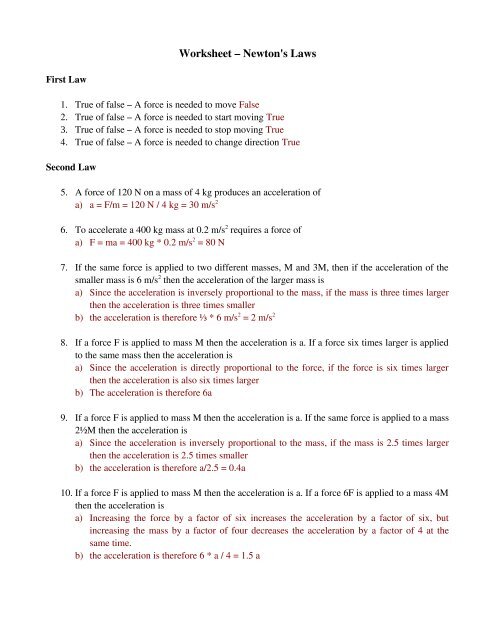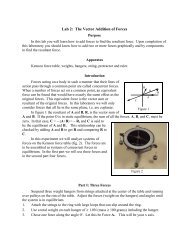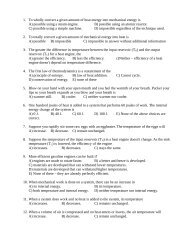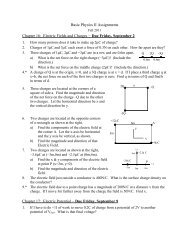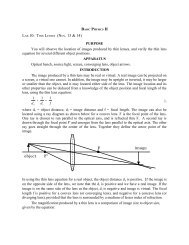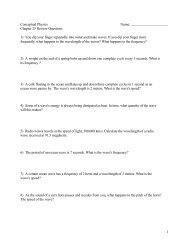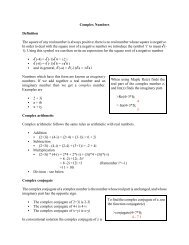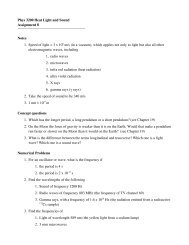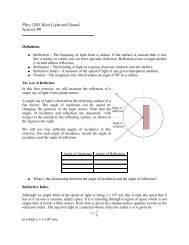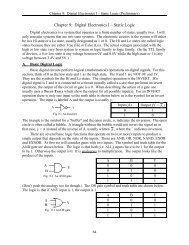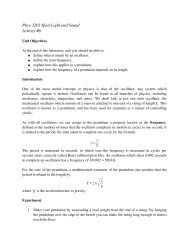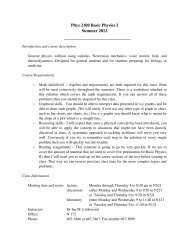Worksheet â Newton's Laws - Physics
Worksheet â Newton's Laws - Physics
Worksheet â Newton's Laws - Physics
You also want an ePaper? Increase the reach of your titles
YUMPU automatically turns print PDFs into web optimized ePapers that Google loves.
<strong>Worksheet</strong> – <strong>Newton's</strong> <strong>Laws</strong><br />
First Law<br />
1. True of false – A force is needed to move False<br />
2. True of false – A force is needed to start moving True<br />
3. True of false – A force is needed to stop moving True<br />
4. True of false – A force is needed to change direction True<br />
Second Law<br />
5. A force of 120 N on a mass of 4 kg produces an acceleration of<br />
a) a = F/m = 120 N / 4 kg = 30 m/s 2<br />
6. To accelerate a 400 kg mass at 0.2 m/s 2 requires a force of<br />
a) F = ma = 400 kg * 0.2 m/s 2 = 80 N<br />
7. If the same force is applied to two different masses, M and 3M, then if the acceleration of the<br />
smaller mass is 6 m/s 2 then the acceleration of the larger mass is<br />
a) Since the acceleration is inversely proportional to the mass, if the mass is three times larger<br />
then the acceleration is three times smaller<br />
b) the acceleration is therefore ⅓ * 6 m/s 2 = 2 m/s 2<br />
8. If a force F is applied to mass M then the acceleration is a. If a force six times larger is applied<br />
to the same mass then the acceleration is<br />
a) Since the acceleration is directly proportional to the force, if the force is six times larger<br />
then the acceleration is also six times larger<br />
b) The acceleration is therefore 6a<br />
9. If a force F is applied to mass M then the acceleration is a. If the same force is applied to a mass<br />
2½M then the acceleration is<br />
a) Since the acceleration is inversely proportional to the mass, if the mass is 2.5 times larger<br />
then the acceleration is 2.5 times smaller<br />
b) the acceleration is therefore a/2.5 = 0.4a<br />
10. If a force F is applied to mass M then the acceleration is a. If a force 6F is applied to a mass 4M<br />
then the acceleration is<br />
a) Increasing the force by a factor of six increases the acceleration by a factor of six, but<br />
increasing the mass by a factor of four decreases the acceleration by a factor of 4 at the<br />
same time.<br />
b) the acceleration is therefore 6 * a / 4 = 1.5 a
Universal Law of Gravity<br />
11. On the surface of the Earth your mass is 45 kg. What would be your mass if you were twice as<br />
far from the center of the Earth Your mass wouldn't change. It would still be 45 kg.<br />
12. On the surface of the Earth your weight is 125 lbs. What would be your weight if you were<br />
twice as far from the center of the Earth<br />
a) If you are twice as far from the center, then r becomes twice as big and r 3 becomes 2 2 = 4<br />
times as big<br />
b) since the force of gravity is inversely proportional to r 2 the force of gravity would become<br />
four times smaller.<br />
c) Your weight would therefore become ¼ * 125 lbs = 31.25 lbs<br />
13. On the surface of the Earth your weight is 125 lbs. What would be your weight if you were on<br />
the surface of a planet of the same radius but 4 times the mass of the Earth<br />
a) The force of gravity is directly proportional to the mass if the planet. If the mass is four<br />
times larger the force of gravity is also four times larger<br />
b) your weight would therefore be 4 * 125 lbs = 500 lbs.<br />
14. On the surface of the Earth your weight is 125 lbs. What is your weight if you were on the<br />
surface of a planet which has twice the radius but 4 times the mass of the Earth<br />
a) The force of gravity is directly proportional to the mass if the planet. If the mass is four<br />
times larger the force of gravity is also four times larger. But the force of gravity is<br />
inversely proportional to r 2 the force of gravity would simultaneously become 2 2 times<br />
smaller.<br />
b) your weight would therefore be 4 * ¼ * 125 lbs = 125 lbs.<br />
15. On the surface of the Earth your weight is 125 lbs. What is your weight if you were on the<br />
surface of a planet which has 1½ the radius but only ¾ times the mass of the Earth<br />
a) The force of gravity is directly proportional to the mass if the planet. If the mass is changed<br />
by a factor of ¾ the force of gravity is also changed by a factor of ¾. But the force of<br />
gravity is inversely proportional to r 2 the force of gravity would simultaneously become<br />
(1½) 2 times smaller.<br />
b) your weight would therefore be ¾ * 125 lbs / (1½) 2 = 41.7 lbs.


